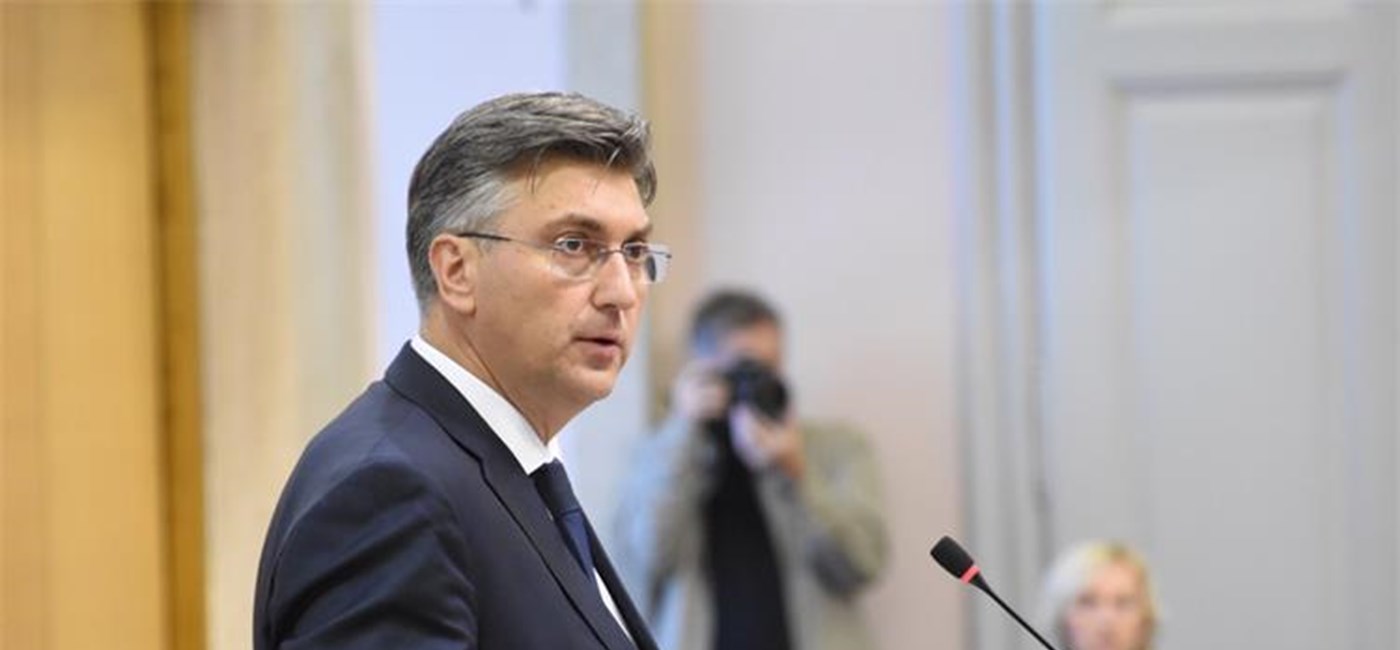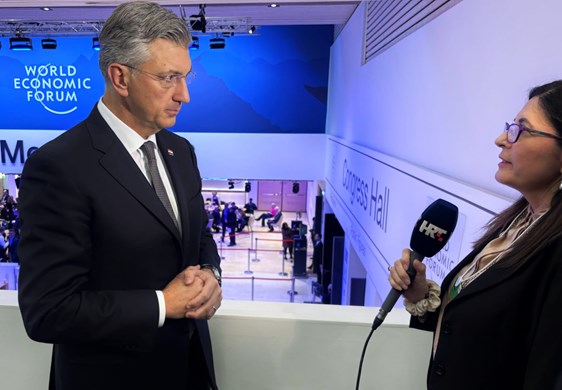"Today, even though there is still a lot of work ahead of us, we can claim that we have achieved significant progress in all areas and there are tangible results on the political, economic and social levels," he said.
Plenkovic presented his report through the four main pillars of the government's policy: Legal security; More competitive economy and a more balanced development; Protecting the family, a tolerant and fair society; A stronger and safer Croatia in Europe and the world.
Speaking about the work of his government in the third year of this term, Plenkovic underlined that this was a year in which political stability was preserved, economic growth was confirmed and tax reliefs and structural reforms continued.
It was year in which we launched an exceptionally large number of infrastructure projects, significantly increased the absorption of European funds and restored our investment rating. We achieved a strong growth of employment, wages, pensions and welfare benefits, said the prime minister.
He recalled that when his government came into office, circumstances were far from good.
Before that we were faced with a polarised society, political instability, a high level of unemployment, excessive taxes, a budget deficit and a poor credit rating, slow structural reforms, weak absorption of European funds and we were soon faced with a systemic crisis in the Agrokor conglomerate, Plenkovic recalled.
PM: Croatian economy shows sound growth
Croatia currently has macroeconomic results that were unimaginable not so long ago and, unlike before, its economic growth has a sound basis, Prime Minister Andrej Plankovic said in an annual report to Parliament on Wednesday.
Plenkovic said that growth was sound and was no longer based on borrowing but on reducing borrowing, reducing the tax and administrative burden, on structural reforms, boosting investment and improving the absorption of EU funding.
"Thanks to this we have macroeconomic results that were unimaginable not so long ago," the PM said, adding that the public debt to GDP ratio had been reduced by about three percentage points annually while the current account showed continued surpluses.
He recalled that until recently Croatia had been included in the EU's excessive deficit procedure because its public debt had reached 85 percent of GDP, and that the situation was reversed by the government's responsible conduct of public finance and implementation of the National Reform Programme and the Convergence Programme.
"Thorough fiscal consolidation made it possible for us to successfully reduce public debt despite the payment of HRK 4.5 billion (€608 million) in state guarantees to the Uljanik Group, mostly inherited from previous governments," Plenkovic said, adding that the government's aim was to keep the shipbuilding sector, but on market principles.
He went on to say that in the three rounds of tax reform, the tax burden had been cut by a total of HRK 6.5 billion (€878 million), and that Croatia was among the EU countries recording the fastest decreases in public debt, which is expected to fall to 71.7 percent of GDP by the end of this year and to 65 percent by 2021.
He said that the improved economic situation resulted in more favourable financing terms for Croatia, which led to interest on public debt dropping from HRK 12 billion (€1.6 billion) to less than 9 billion (€1.2 billion) and interest on household and corporate loans decreasing as well. He said that the government expected this trend to continue.
Plenkovic said that the renewed confidence in Croatia's economic stability was best illustrated by the fact that in August this year the Ministry of Finance had for the first time issued a treasury bill at a negative interest rate of -0.05 percent.
While the country's credit rating was downgraded twice between 2012 and 2015, this year two of three global ratings agencies, Fitch and S&P, have increased Croatia's credit rating to investment grade, the PM said.
Plenkovic said that in this way yet another goal he had announced last year had been achieved and that an important obstacle to attracting foreign investment had been removed, which was key to further development and job creation.
The PM said that the government was aware of the great potential of unused and neglected state property which could help revitalise towns and municipalities and spur growth and job creation.
He said that work would be stepped up to deal with 2,300 applications from towns and municipalities seeking state-owned property for development of their projects of high financial value, adding that the medium-term potential of this measure was estimated at HRK 5 billion (€675 million).
Gov't continuing to work on country's balanced development, says PM
Prime Minister Andrej Plenkovic said on Wednesday his government would continue to work on a balanced development of the country, adding that local budgets increased by nearly 20%, i.e. over HRK 2 billion in total.
"By amending the law on the financing of local government and ceding all income tax revenue, in the first year local budgets increased by 18.4%, i.e. over HRK 2 billion," he said in parliament, speaking about his cabinet's performance over the past year.
Over the first nine months of this year, local revenues thus increased by 9%, i.e. HRK 900 million, Plenkovic said, adding that he would continue to work on Croatia's fiscal and functional decentralisation.
The ten sessions the government held across the country contributed to that, with HRK 25.6 billion worth of projects contracted for the development of counties, municipalities and towns, he said.
He added that 585 laws were passed in his cabinet's term.
Public servants' salaries to rise 6.12% next year, says PM
Prime Minister Andrej Plenkovic said on Wednesday the government would offer a 6.12% pay rise for all public servants next year in three instalments of 2%, which is why a VAT cut of one percentage point planned as of January 1 will be postponed.
"At the same time, we realise that many job complexity indices are unfair and that they were changed inconsistently for years. We wish to resolve this issue too, for which we will hire experts who will precisely establish the real complexity indices all jobs based on a detailed analysis," Plenkovic said in parliament.
The government is open for dialogue on that with the social partners in order to find a solution to the problems that are the cause of numerous illogical things, he added. "Also, we are raising the non-taxable income from HRK 3,800 to 4,000. I'm also announcing a further significant minimum wage increase after consultations with the social partners."
He recalled that his government had raised the base pay for public servants, which did not go up between 2012 and 2016, by 11.5% (HRK 587).
PM says government has raised pensions by 12%
Even though we promised to raise pensions by 5% by the end of our term, we have already raised them by 12%, twice as much as the previous three governments, Plenkovic said.
"Through sound economic growth and by cutting taxes for citizens and companies, we have ensured in only three years a three times higher average wage and two times higher minimum wage and pensions than the previous three governments," he said, adding that he understood the impatience of workers in education, healthcare and other public services, respecting their position that pay should be higher.
"However, we believe that after raising the salaries of all public servants by 11.5% in three years and offering an additional increase of 4%, the teachers' strike wasn't justified."
Plenkovic cabinet ready for election at any moment
Submitting a report on the government's work, Plenkovic said his cabinet was ready for an election at any moment so that citizens could decide to whom they wanted to entrust the future of Croatia and their children.
He criticised the 2011-16 Social Democratic Party (SDP) government of "not being capable of pursuing a responsible economic policy and raising the standard of living."
He said that his government, despite numerous attempts at destabilisation and false accusations, had worked on delivering on all of its election promises for citizens' benefit, achieving many things.
"There were those who had an opportunity to take Croatia on the road of economic recovery, but they weren't up to the task. They divided society, they couldn't utilise the European Union membership for Croatia's development and to strengthen its position, they froze salaries and pensions and achieved a record high unemployment, they raised taxes while at the same time indebting Croatia. The only result of their term was that they indebted every citizens by an additional HRK 17,500," Plenkovic said about the SDP government.
"Unlike them, we know where we are taking Croatia and how to run a state. In our activity, we are guided by patriotism, solidarity with the neediest, the values of freedom and the responsibility of every individual."
Plenkovic went on to say that under his government the number of backlog court cases dropped from "almost 530,000" three years ago to 350,000 this past May. The government is also investing in the better equipment and more efficient organisation of courts and prosecutor's offices.
He said that today entering the judicial profession, the appointing of judicial officials and decision making were left up to professionals, without any involvement from the executive authority or political influence.
The independence of the judiciary does not rule out the responsibility of judicial officials for their decisions, which must be unbiased and always based on the law and facts, he added.
Speaking of citizens with frozen bank accounts, a big problem encountered by his cabinet, he recalled that a law package was adopted to resolve the issue, enabling debt write-offs, as a result of which, he said, the number of these citizens dropped from 325,000 in May 2018 to 251,000 this past August.
Text: Hina


.jpeg?preset=news-carousel-img)



